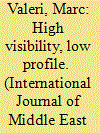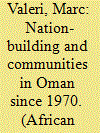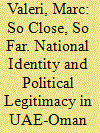| Srl | Item |
| 1 |
ID:
177208


|
|
|
|
|
| Summary/Abstract |
Given its limited oil and gas resources compared to its neighbours, energy diversification has been Oman’s stated goal since at least the 1980s. Yet, this paper argues that, due to the country’s structure of power generation, both issues of economic diversification and energy security are intimately linked and cannot be dissociated. Oman’s national policy for the energy sector, the political and economic challenges of the energy subsidy reforms implemented since the mid-2010s and the energy priorities as highlighted in the new long-term “Oman Vision 2040” national strategy are examined here. This paper also shows that the energy debate has played a critical role in the shaping of Oman’s foreign policy towards its Gulf Cooperation Council (GCC) counterparts, Iran and India, out of a desire to keep Oman’s –– more symbolic than real –– independence in working out its energy needs.
|
|
|
|
|
|
|
|
|
|
|
|
|
|
|
|
| 2 |
ID:
095113


|
|
|
|
|
| Publication |
2010.
|
| Summary/Abstract |
If the U.S. invasion of Iraq in 2003 has produced unprecedented consequences for the internal policies of Middle Eastern regimes, this is not related to the upsurge of democratization that was supposed to spread like a contagion through the neighboring countries. Rather, it is due to the increased impact of the Shi?i issue on the national political agendas of many Arab states. Following the collapse of Saddam Hussein's regime, many observers thus drew attention to the emergence of what they regarded as a Shi?i "revival" in the Middle East-a perception that the military success of the Lebanese Hizbullah against Israel in the summer of 2006 seemed to confirm.
|
|
|
|
|
|
|
|
|
|
|
|
|
|
|
|
| 3 |
ID:
078570


|
|
|
|
|
| Publication |
2007.
|
| Summary/Abstract |
Since 1970, building a new national identity by reunifying Oman's ethno-linguistic groups has been at the heart of Sultan Qaboos's political project. This paper focuses on the place of Omani who returned from the former colonies of Zanzibar and East Africa, responding to Sultan Qaboos's call to 'nationals' abroad. While they played a leading role in the modernization process of the Sultanate, these Swahili-speaking Omani faced prejudices from the population who stayed at home and were forced to give guarantees to the others of their full belonging to the nation. As a consequence, despite their internal differences, they have progressively developed a new collective identity, which has its raison d'être within the framework of the modern Omani State, and can only be explained by the necessity to find their place in it
|
|
|
|
|
|
|
|
|
|
|
|
|
|
|
|
| 4 |
ID:
162260


|
|
|
|
|
| Summary/Abstract |
Since the accession of Oman and the United Arab Emirates to the independence in the early 1970s, the building of both a state apparatus and a nation has lain at the heart of the political projects of respective rulers of these countries to assert their legitimacy and control over their respective territory. This issue of the mutual relationship has been particularly crucial, given the two countries’ shared modern history, and the tribal and ethnic proximity between inhabitants living across the new international boundary. The study of the two border towns of al-Ayn (United Arab Emirates) and al-Buraymi (Oman) provides a unique window onto unfolding patterns of the construction of political sovereignty in post-colonial states and the link between the building of national identity and the physical demarcation from the (br)other.
|
|
|
|
|
|
|
|
|
|
|
|
|
|
|
|